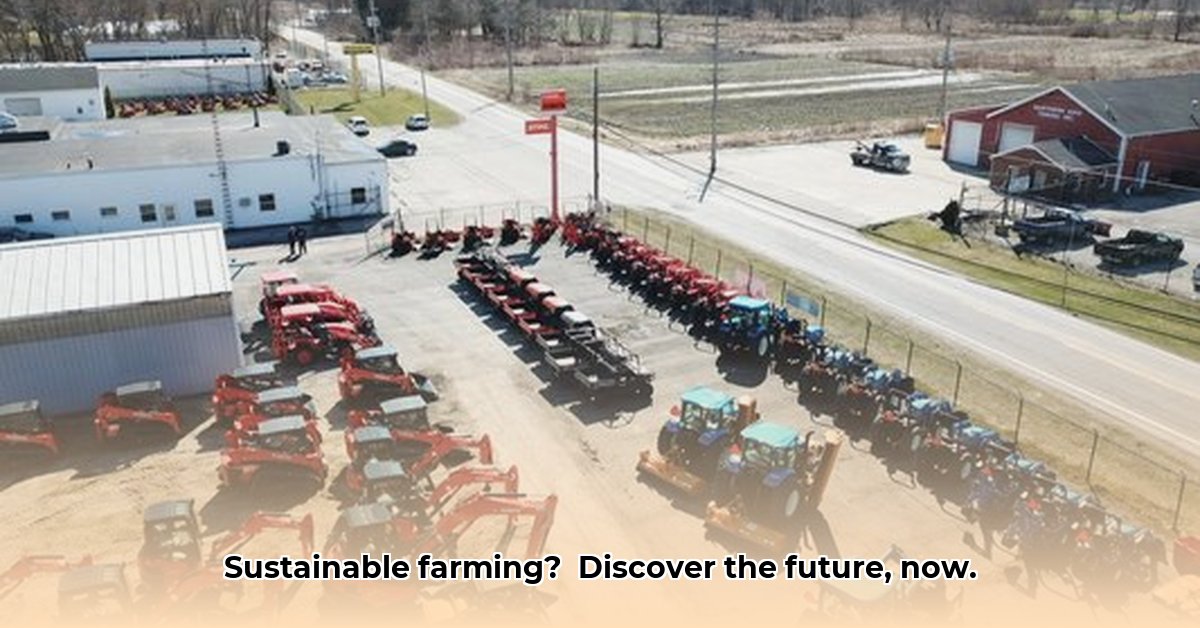
Akron Tractor & Equipment (ATE) has long served Ohio farmers, providing the machinery vital for agricultural success. However, the agricultural landscape is evolving rapidly, with sustainability rising as a paramount concern. This article examines how ATE can leverage its existing strengths to become a leader in sustainable agricultural solutions, detailing actionable strategies for the company, farmers, and the broader community. We'll explore ATE’s current position, the burgeoning market for sustainable farming equipment, and a comprehensive plan for transitioning towards a greener future. For farmers seeking financing options, check out easy tractor financing.
ATE's Current Position: A Foundation for Sustainable Growth
ATE possesses significant assets: a robust customer base built on trust and reliable service, and an extensive inventory exceeding 1435 items. This strong foundation provides a springboard for incorporating sustainable solutions. However, a dedicated focus on sustainable agriculture practices is currently lacking. While ATE undoubtedly sells equipment capable of sustainable farming (fuel-efficient tractors, precision farming tools), this capacity hasn't been explicitly marketed. This represents a substantial untapped opportunity. The question isn't if ATE can adopt sustainable practices, but how they can quickly and effectively capitalize on this burgeoning market.
The Expanding Market for Eco-Friendly Farming Practices
Consumer demand for sustainably produced food is experiencing exponential growth. Consumers are increasingly aware of the environmental impact of their food choices and actively seek out products grown using eco-friendly methods. Farmers, facing growing pressure to reduce their carbon footprint and improve operational efficiency, actively seek equipment facilitating these goals. This creates a powerful market synergy—a high demand for sustainable solutions coupled with a limited supply. ATE is uniquely positioned to fill this gap and become a key player in this expanding sector.
Actionable Strategies for Sustainable Success at ATE
To effectively integrate sustainable practices, ATE should adopt a three-phased approach:
Phase 1: Identifying Sustainable Assets (0-3 Months)
- Inventory Audit: Conduct a thorough review of ATE's entire inventory, identifying all equipment contributing to sustainable farming (fuel efficiency, reduced emissions, precision farming technologies, low-impact tillage tools).
- Targeted Categorization: Create a dedicated "Sustainable Ag Solutions" category online and within the physical inventory system, making it easy for customers to locate relevant equipment.
- Data Collection: Begin compiling data on the environmental impact of different equipment types, laying the groundwork for future marketing and decision-making.
Phase 2: Strategic Marketing and Community Engagement (3-6 Months)
- Website Enhancement: Develop a prominent "Sustainable Ag Solutions" section on their website, showcasing identified equipment with high-quality images and detailed descriptions emphasizing environmental benefits and cost savings.
- Targeted Marketing Campaigns: Create marketing materials (brochures, online ads, social media campaigns) specifically targeting environmentally conscious farmers.
- Community Partnerships: Collaborate with local farming communities, agricultural organizations, and universities, offering demonstrations, workshops, and educational sessions showcasing ATE’s sustainable offerings.
Phase 3: Long-Term Sustainability and Growth (6+ Months)
- Strategic Supplier Partnerships: Collaborate with suppliers providing sustainable equipment and parts, expanding offerings and reinforcing ATE's commitment.
- Government Grant Exploration: Research and apply for government grants and incentives supporting sustainable agriculture.
- Continuous Improvement: Continuously monitor evolving sustainability standards and best practices, adapting strategies as needed.
Beyond Equipment: Becoming a Trusted Advisor
ATE’s transition should not be solely about selling equipment; it’s about establishing itself as a trusted agricultural advisor. This involves providing expertise beyond mere product sales—offering workshops on efficient irrigation, soil health management, and sustainable crop rotations. This builds customer loyalty and strengthens ATE's position as a leader in this evolving market.
Conclusion: Embracing the Future of Sustainable Agriculture
The shift toward sustainable agriculture is not a trend; it's a fundamental transformation. ATE possesses the ideal foundation to lead this transition, leveraging existing strengths to create a profitable and environmentally responsible business. By proactively adopting these strategies, ATE can secure its future and contribute significantly to a healthier, more sustainable agricultural sector. The opportunity for growth and positive environmental impact is significant—the time to act is now.